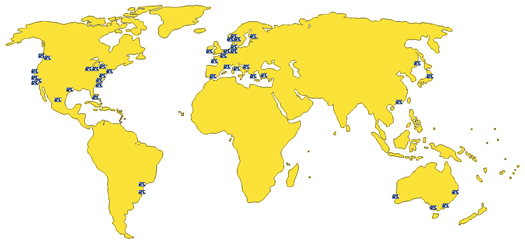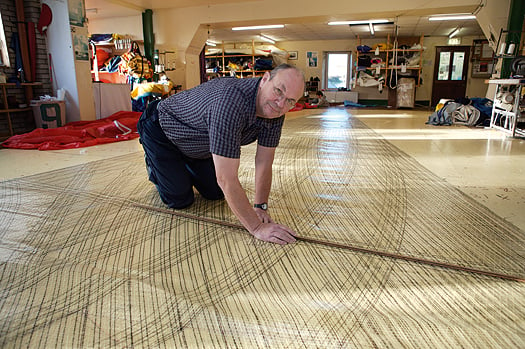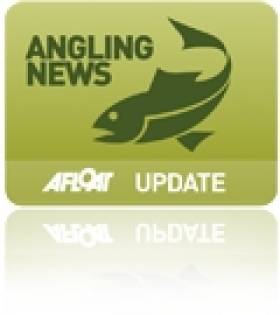Displaying items by tag: Des
UK Halsey Badge Now on Irish Sails
Sails bearing the UK Halsey badge are appearing from the McWilliam Sail loft in Crosshaven, Co. Cork just two weeks after the announcement that Cork sailmaker Des McWilliam has been appointed head of one of the world's largest sailmaking firms.
He will replace American sailmaker Butch Ulmer - the "U" of UK - who is retiring.
UK-Halsey was founded in City Island, New York in 1946 as Ulmer Sails and now has a network of sail lofts around the world, with 17 in North America, 21 in Europe, 3 in Asia, 4 in Australia, and two in South America. It has a reputation for using the most advanced techniques and technology to build long-lasting and fast sails.
The McWilliam loft in Crosshaven, which has been in business for 40 years, will become the nerve centre for development of the group.
McWilliam will continue to employ six manufacturing and service staff in the Cork harbour premises, including recent recruit Kenneth Rumball, the Irish Fireball dinghy champion.
McWilliam is a prestigious brand name - suits of their sails have equipped competitors in the Admiral's Cup, incorporating the Fastnet, and other international and national yachting events.
The first sail produced in Crosshaven under the new name was a spinnaker for a Dehler 34, followed by a Mermaid jib and a mainsail using the latest Titanium technology for a 50-foot yacht.
"I like the idea that we're sitting here in our old stone watermill in Crosshaven talking about high-grade aerodynamics across the world," McWilliam said, "however, I'm just as happy designing good sails for people who are passionate about getting out in a boat".

Locations of UK Halsey lofts around the world which are managed from Crosshaven by Des McWilliam
McWilliam Becomes President of World Sailmaking Firm
A prestigious appointment to the top of one of the world's biggest sail making firms is a life time reward for a member of a Cork sailing family who built a sail-making business in Ireland.
In a major Irish marine industry announcement, Crosshaven based sail maker Des McWilliam (62) has been appointed President of world sail making Group UK-Halsey.
UK-Halsey is one of the top three sailmakers in the world with 46 lofts worldwide and an annual estimated turnover of €15million.

The loft is credited with using the most advanced technologies in the production of sails including Titanium sails where sail panels are glued rather than stitched for lightness and better shape.
McWilliam's appointment was made at the group's annual meeting in New York this week following the retirement of American founder Butch Ullmer.
Established in 1946 as Ulmer Sails, UK-Halsey Sailmakers is one of the oldest group of sail lofts in North America and has expanded around the
world to become the largest network of owner-run sail lofts.
There are 17 UK-Halsey lofts in North America, 21 in Europe, 3 in Australia, 3 in Asia and two in South America.
The UK Halsey loft in Crosshaven Co.Cork becomes the centre of operations as McWilliam rolls out new group strategies in challenging and competitive
times for the 45 sail makers.
Now in its fortieth year of sail manufacture in Ireland McWilliam says this week's appointment will underpin the future of the Cork loft in a time of
recession.
McWilliam employs six staff in Crosshaven, boosted this season by the appointment of Irish Fireball dinghy champion Kenneth Rumball.
Fed up Flunking Starts? A New Distance to Start Line Computer is the Answer
Want to improve your starting? Fed up looking for transits only never being able to see the end of the line? Here's a new innovation for racing sailors that Cork sailmaker Des McWilliam has already declared 'a brilliant piece of kit'.
Irish distributors CH Marine are offering a 7 day free trial they're that sure you'll never be late or over the line again. There's a special Irish launch price of €449 for this start computer. Click for online demo and listen to inventor Alec Stewart talking about the 'perfect bowman' below.
Minister Lenihan Supports Environmental Initiative on Dublin's River Dodder
In preparation for the field trip Des Chew, Project Manager of the Dublin Angling Initiative visited the school and gave the pupils a talk on water quality, the lifecycle of trout and the art of fly-fishing. The pupils then participated in a field trip along the River Dodder, starting at Rathfarnham shopping centre and finishing at the confluence of the Dodder and Owendore rivers at Bushy Park. Minister Lenihan was joined by TV celebrity and angler Derek Davis.
Fisheries staff from Dublin Angling Initiative and Inland Fisheries Ireland took kick samples and were ably assisted by Gerry Heaslip and Brian McDonagh of the Dodder Angling Club. The children identified invertebrates and their delight could be heard far and wide as they found many different species of stonefly and caddis fly! Looking at water pollution indicators, the children could establish that the presence of these different types of invertebrates indicated the good water quality in the river. This is not surprising given the very healthy stock of wild brown trout in the river.
Minister Lenihan, remarked:
'It is wonderful today to see the young people out learning about their local river. The River Dodder is a very important river in south Dublin, it has good water quality, contains a healthy population of wild brown trout and is a wonderful angling resource.
This is in no small part due to the excellent relationship that the Dublin Angling Initiative and Inland Fisheries Ireland have with the Dodder Angling Club'.
Following this the children were given information packs on fish species, invertebrates and fish species posters. St. Pius X School has participated in Inland Fisheries Ireland's 'Something Fishy' programme in previous years and were thrilled to take part in such an exciting field trip of their local river.
The 'Something Fishy' project was developed by Inland Fisheries Ireland (formerly the Central and Regional Fisheries Boards) in association with Blackrock Education Centre and has proved a highly successful way of encouraging young people to take an interest in Irish fish species, their local environment and habitat. In 2010 almost 1,000 young people participated in the Something Fishy programme within the Eastern River Basin District.
































































